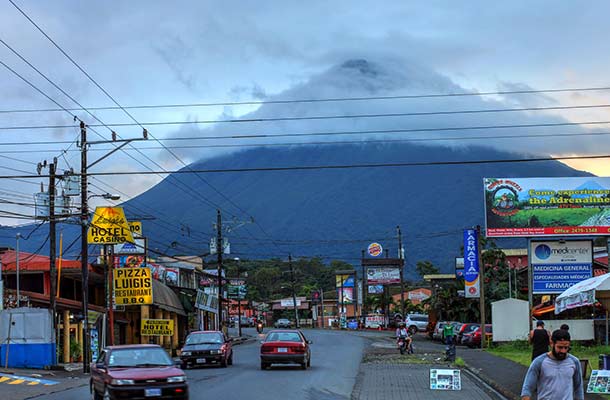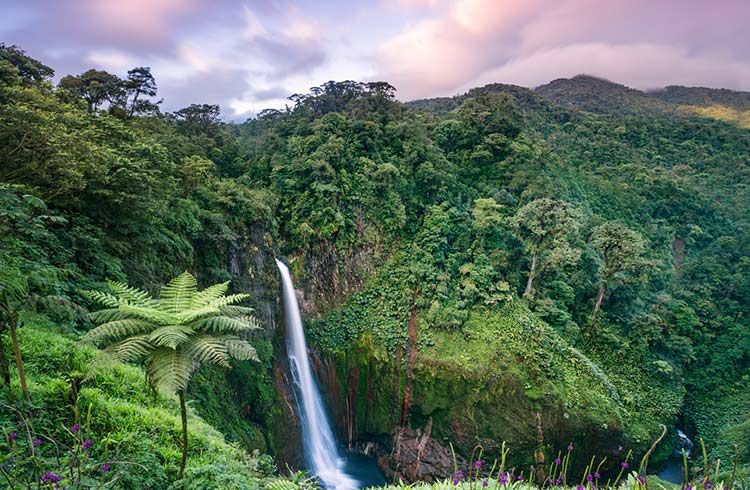Transport in Costa Rica: Tips for Traveling Around Safely
Getting around Costa Rica by car, bus or taxi can be a challenge. Here are a few tips to help you make your way around safely.
 Photo © iStock/repistu
Photo © iStock/repistu
- Rental cars in Costa Rica
- Costa Rican roads
- Night driving
- Dangerous driving
- Fines on Costa Rican roads
- Are taxis safe?
- Bus safety in Costa Rica
- Be Prepared
Rental cars in Costa Rica
Rental cars are clearly marked as such, which is supposed to either warn other drivers you're not familiar with the road rules or give locals a chance to be extra helpful. Instead, it makes them easy for thieves to spot, like painting a great big "rob me!" sign on each one. Lock up and don't leave valuables in them (a tip: the thieves have worked out the camera is probably in the trunk).
If you do decide to throw caution to the wind and rent a car, here are some things to watch out for.
Hitchhiking is illegal in Costa Rica.
Costa Rican roads
Road conditions are poor around the country, with huge potholes and other road hazards are common. Many travelers rent vehicles, cause damage to them, and have to pay exorbitant fines. Driving outside of San José at night can be dangerous due to narrow or poorly maintained roads, many of which lack adequate lighting, markings, guardrails, and street signs.
Some streets are marked incorrectly; others are not marked at all. You'll need a good map that lists all the town names, including the smaller locations, otherwise, you might easily end up lost.
During the rainy season, landslides and washed-out roads are common.
Night driving
Forget it. Driving in Costa Rica under the best circumstances is a challenge, doing so at night is downright dangerous. Many roads don't have adequate lighting making visibility difficult. Additionally, unless you know your way around, routes can be unpredictable with hills and sharp turns and no safety features such as guard rails to protect you should you misjudge a bend.
Dangerous driving
Local drivers are notorious for speeding and driving recklessly. Always remain aware of those around you, drive defensively and err on the side of caution whenever there is a question of safety. If you see someone driving erratically in your direction, yield and let them go by. Even if you have the right of way, it's not worth the risk.
Violent crime and theft are both issues in Costa Rica, so it's advised that you always drive with your doors locked and windows up. Some criminals deliberately cause accidents as a way to get unsuspecting tourists to pull over so they can approach the vehicle and rob them, sometimes at gun or knifepoint. If you are involved in an accident, regardless of who caused it, you should drive until you reach a safe place to pull over (preferably a police station).
Large demonstrations and protests occur rather frequently in Costa Rica and may result in roadblocks being placed in surrounding areas. If you come to a road blockade, you're advised not to cross it, even if there is no one around or it appears to be there for no good reason. You never know what's on the other side.
Fines on Costa Rican roads
Recent laws have been enacted increasing traffic-related fines and penalties, so be careful to obey all the local laws when on the road. Expensive fines are assessed for those caught speeding, drunk driving, not wearing safety belts and driving while using a mobile phone.
Whatever you do, don't try and talk a police officer out of giving you a ticket if you get pulled over you may be charged with trying to bribe a law officer and fined as much as $400.
Are taxis safe in Costa Rica?
Given all the risks associated with renting a vehicle and driving yourself around Costa Rica, it's not surprising that hailing a taxi is often the preferred method of transportation. They're widely available and relatively cheap, provided you are careful not to get ripped off.
Many travelers have reported various scams involving taxis. Some drivers claim their meters are broken, others will have meters but will take travelers on a scenic route, and other travelers have been robbed. Many travelers prefer to use Uber because they know how much they’ll pay before getting in. That said, Uber is only available in some areas of the country
You should only use official taxis, which are designated by their red color and yellow triangles on the side panels.
Bus safety in Costa Rica
Read online reviews for companies that offer transport, or get a recommendation from your hotel or hostel.
Travel by bus is popular for visitors. Just keep in mind that buses and bus stations are havens for thieves.
On short trips, remain alert and keep your belongings concealed or held tightly in front of you. On longer trips, avoid using the overhead bins to store baggage as they are not safe.
Don't fall asleep during your trip or you may wake to find your belongings missing. Or, if you're traveling with another person, take turns resting so the bags are always being watched.
Be prepared
Regardless of how you choose to get around, being able to see the natural beauty and experience the endless adventure that Costa Rica has to offer is a journey not to be forgotten. Just know what to expect beforehand, make careful choices and use common sense and your travels there will go off without a hitch.
Related articles
Simple and flexible travel insurance
You can buy at home or while traveling, and claim online from anywhere in the world. With 150+ adventure activities covered and 24/7 emergency assistance.
Get a quote

3 Comments